The Plextor M9Pe NVMe SSD Review: Teaching An Old Chip New Tricks
by Billy Tallis on May 24, 2018 1:00 PM ESTRandom Read Performance
Our first test of random read performance uses very short bursts of operations issued one at a time with no queuing. The drives are given enough idle time between bursts to yield an overall duty cycle of 20%, so thermal throttling is impossible. Each burst consists of a total of 32MB of 4kB random reads, from a 16GB span of the disk. The total data read is 1GB.
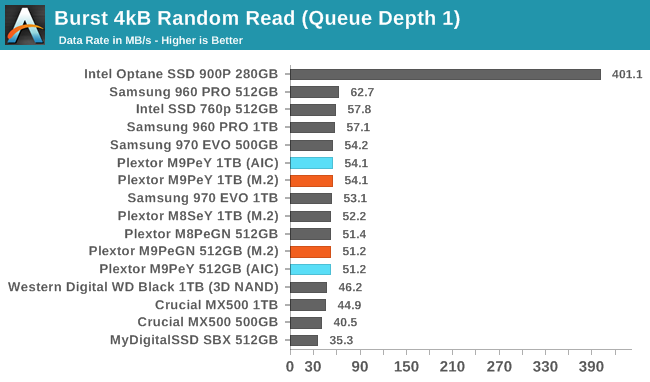
The burst random read performance of the Plextor M9Pe is good at either of the two tested capacities. Only a handful of flash-based SSDs outperform the 1TB M9Pe, and the 512GB model is just over 5% slower.
Our sustained random read performance is similar to the random read test from our 2015 test suite: queue depths from 1 to 32 are tested, and the average performance and power efficiency across QD1, QD2 and QD4 are reported as the primary scores. Each queue depth is tested for one minute or 32GB of data transferred, whichever is shorter. After each queue depth is tested, the drive is given up to one minute to cool off so that the higher queue depths are unlikely to be affected by accumulated heat build-up. The individual read operations are again 4kB, and cover a 64GB span of the drive.
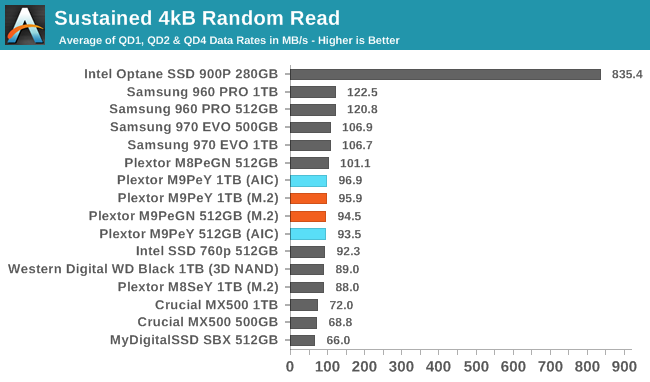
The sustained random read speeds of the M9Pe are better than most TLC drives, though the Samsung 970 EVO is a bit faster still. The MLC-based M8Pe is also slightly faster than the M9Pe on this test.
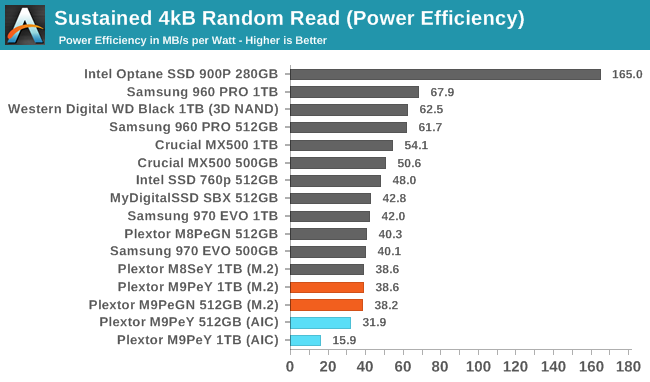 |
|||||||||
| Power Efficiency in MB/s/W | Average Power in W | ||||||||
The power efficiency of the Plextor M9Pe during random reads is quite poor, but it's only slightly worse than the Samsung 970 EVO and the previous generation of Plextor drives.
 |
|||||||||
At low queue depths, the random read performance of the two tested capacities of the Plextor M9Pe is nearly identical, and the larger model doesn't gain a significant lead until queue depths are well above 8.
Random Write Performance
Our test of random write burst performance is structured similarly to the random read burst test, but each burst is only 4MB and the total test length is 128MB. The 4kB random write operations are distributed over a 16GB span of the drive, and the operations are issued one at a time with no queuing.
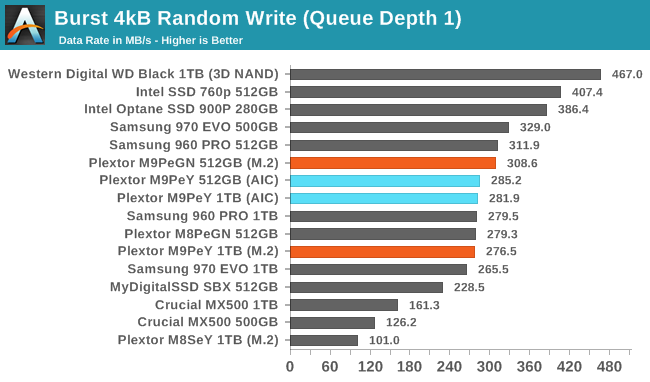
The burst random write speeds from the Plextor M9Pe are about average for a high-end NVMe SSD. Several Samsung drives score about the same as the M9Pe. The WD Black and Intel 760p lead with the fastest write caches.
As with the sustained random read test, our sustained 4kB random write test runs for up to one minute or 32GB per queue depth, covering a 64GB span of the drive and giving the drive up to 1 minute of idle time between queue depths to allow for write caches to be flushed and for the drive to cool down.
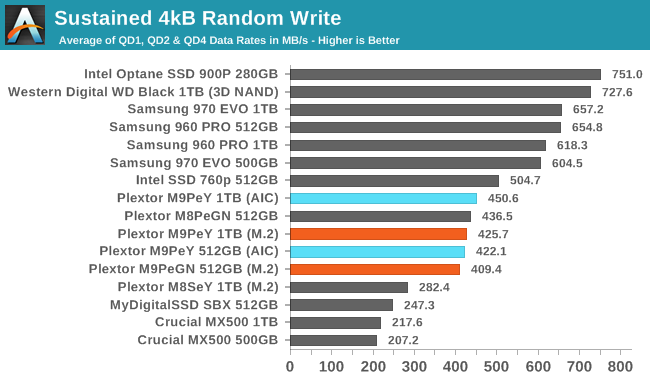
On the longer random write test, the Plextor drives are all clustered together with very similar performance, though it appears the heatsink helps a little bit here. The Samsung NVMe drives are all performing much better than the Plextor drives, and the WD Black holds the spot as the top flash-based SSD on this test.
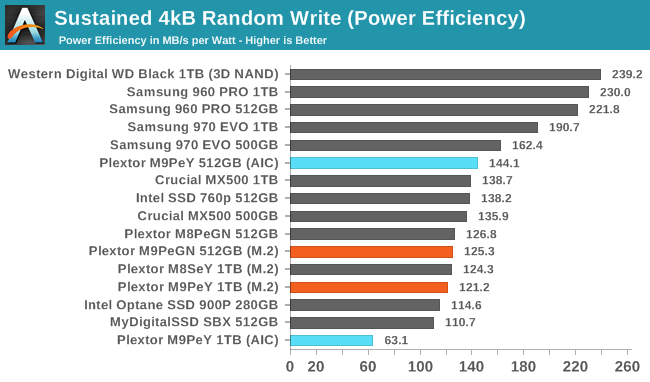 |
|||||||||
| Power Efficiency in MB/s/W | Average Power in W | ||||||||
Even with 3D NAND, the Plextor drives still deliver relatively poor power efficiency during random writes. The controller and DRAM both need to be updated to newer, lower-power designs.
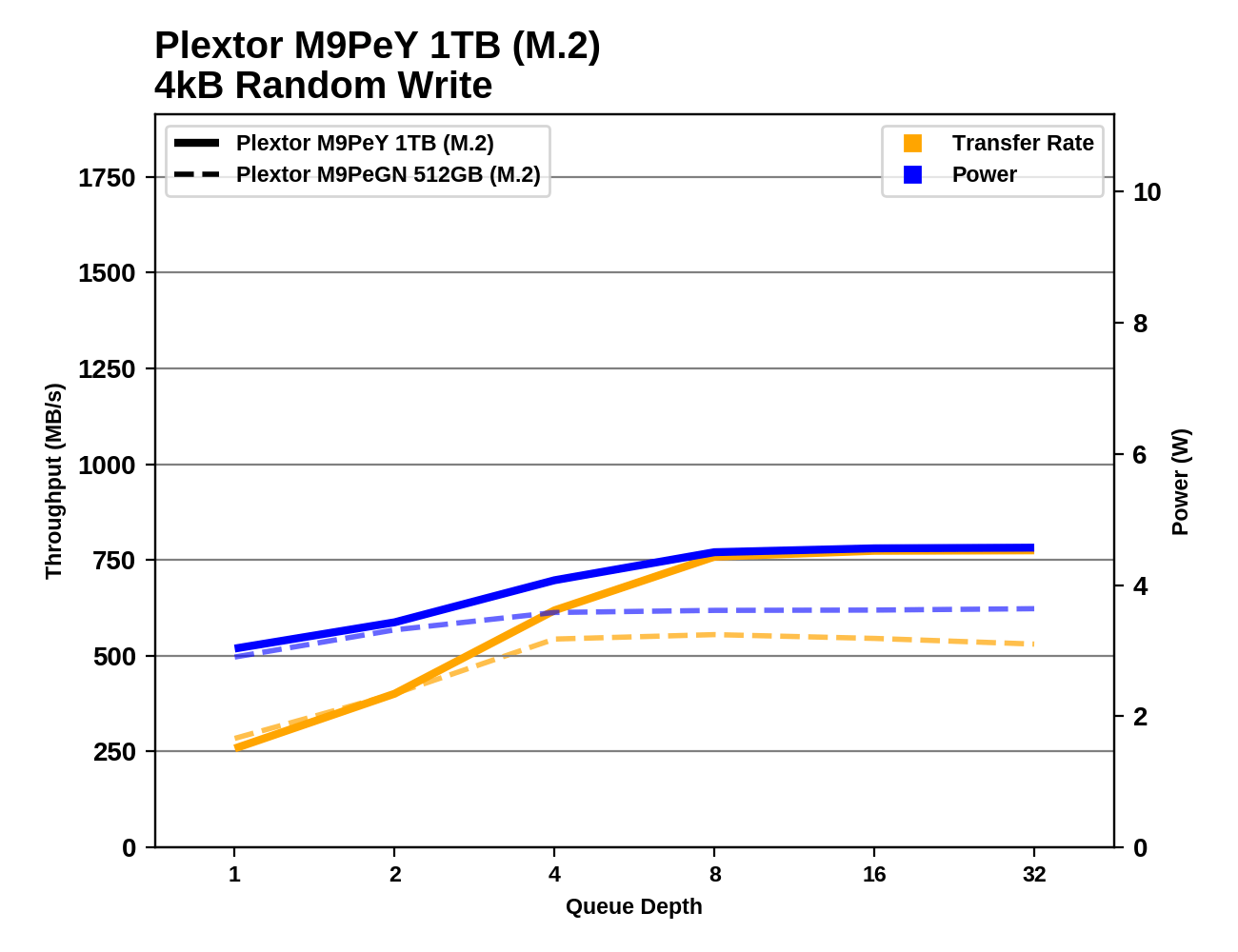 |
|||||||||
The 512GB M9Pe hits its full random write speed at QD4, while the 1TB model is able to continue increasing performance up to QD8, leaving it with a much higher overall limit. Both capacities are well-behaved once reaching saturation, and don't appear to be having major garbage collection issues.










15 Comments
View All Comments
Drazick - Friday, May 25, 2018 - link
I can see why you model Windows compatibility as a moving target.But in that case I think I read somewhere it was a known issue of the drives.
Would you approach Microsoft and find out?
It would be only fair before making assumptions.
DigitalFreak - Thursday, May 24, 2018 - link
I wish HP would hurry up with the 2TB version of the HP EX920.shabby - Thursday, May 24, 2018 - link
The ADATA XPG SX8200 uses the same controller but with more provisioning, a bit less space though, but it gives it a bit of a boost compared to the ex920. Review is on tomshardware for both.peevee - Wednesday, May 30, 2018 - link
Why does not AT review EX920? Beats overpriced Samsungs they are pushing all the time?asava - Thursday, June 21, 2018 - link
Hello,Any chance you could provide the identify namespace information for this drive? Under linux that would be by "nvme id-ns /dev/nvme0n1".
Thanks!